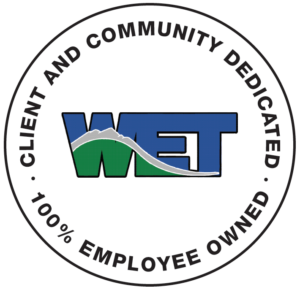ELECTRIC POWER GENERATION FACILITIES
Utah & Wyoming
Since our founding in 2001, WET has provided investigation, sampling and monitoring support to PacifiCorp at five coal and natural gas power plants in Utah and Wyoming. Initially, WET supported the installation of groundwater monitoring networks at the various waste management units on the plants, to aid in performing groundwater compliance monitoring for state issued operating permits. At various stages of monitoring, releases of managed waste streams have taken place, such that hydrologic/hydrogeologic investigations, sampling of source material and other contaminated media, and completion of remedial investigations to determine the nature and extent of contamination have been completed. Since 2018, these investigations have included remedial investigations of seven waste management units at five power plants in both Utah and Wyoming, to determine if impacted groundwater has reached the plant property boundary and/or has migrated to locations offsite. These efforts have included characterization of hydrogeologic conditions in both alluvial and shale aquifers underlying the waste management units, to aid in determining preferred groundwater flow/migration pathways. This portion of the investigation has included quantifying the lithology of the uppermost aquifers, as well as deeper shale aquifers underlying the water table. Investigations have combined traditional chemical analyses (metals, anions) with sampling and analysis of groundwater for isotopes of water and sulfur, to aid determining the origins of contaminated groundwater from multiple potential sources on the facility, while also aiding in determining the nature and extent of impacted groundwater at each facility.
Using data acquired from various investigations, WET has applied these results to support groundwater modeling efforts. One example was the proposed expansion of a waste management unit in Wyoming. The project involved extensive investigation and groundwater modeling which allowed PacifiCorp to secure a permit to expand an existing pond. A MODFLOW/MT3D model, in conjunction with geochemical modeling, provided detailed information about the extent of contamination resulting from past releases, and provided the differentiation between FGD Pond water, naturally occurring shale water, and water from a natural evaporation basin. A complete understanding of geologic and hydrogeologic relationships at this large-scale site was essential for both regulatory compliance and litigation. With the aid of WET’s professionals, a monitoring network and a groundwater capture system was installed to address past leakage from the pond, and an agreement was reached with the state of Wyoming that all stakeholders accepted, allowing pond expansion to proceed.
In addition to management of Coal Combustion Waste, WET has successfully investigated and remediated various other releases at these facilities including diesel, turbine oil and process acids. Remedial actions have ranged from excavation of acid and hydrocarbon impacted soil to recovery wells and trenches to intercept free phase hydrocarbons and remove them from the aquifer. Because of the scale of these releases, WET has been actively remediating these sites for over 20 years and adapting to seasonal variation in migration by incorporating cutoff walls or hydraulic control of plume migration. WET personnel also provided expert witness support in the form of written submittals, depositions, and testimony to aid in determining if groundwater impacts found on one Utah plant, had resulted in offsite impacts to adjoining property owners and surface waters of U.S. Their facility knowledge, technical expertise and expert witness testimony aided in the dismissal of the lawsuit in 2019.
WET routinely are assigned statements of work by PacifiCorp and completes these tasks in full compliance with the regulatory and technical requirements they contain. WET also routinely issues subcontracts on behalf of PacifiCorp to aid in the completion of plant-specific environmental or hydrogeologic investigations. These subcontracts contain both technical and regulatory requirements which flow to subcontractors. Upon completion of their tasks, subcontractor deliverables are reviewed for their compliance with these requirements, and comments/adjustments are made as needed to ensure their deliverables are of sufficient quality to support decision making. WET personnel routinely provide technical support and presentations at meetings with local governments, other regulatory agencies, and at public meetings to aid PacifiCorp with community outreach or other stakeholder involvement relating to investigations, groundwater monitoring, sampling, and remediation at the five facilities we support. These range from periodic meetings with state regulators, to preparation of meeting materials and technical deliverables, reviews of these submittals with regulatory agencies, and participation in public meetings.



